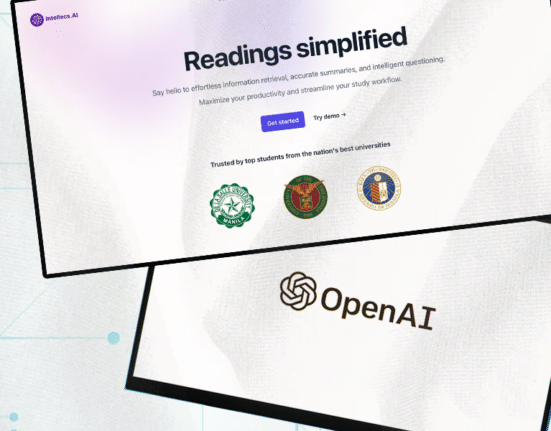LONG reading materials are college students’ archnemesis. Who would want to spend time scrutinizing a lengthy piece of literature, then write a reflection about it while juggling other academic responsibilities?
Software engineer Neil Ruaro, 18, can relate to this frustration. Studying at the University of the Philippines has given him a bunch of readings. These materials often take up a lot of his time when he could have spent it enhancing his skills in coding.
This has driven him to develop an artificial intelligence (AI) tool called intellecs.ai that would help students accomplish this time-demanding task.
In an interview with republicasia, Ruaro said he started working with the AI tool in March, but the idea of creating the “ultimate reading buddy” has been lingering on his mind since the beginning of the year.
The tool was officially launched on June 16.
Studying at UP can be so tiring, especially with all those long readings 😩
— Neil 🏆 (@neil_ruaro) June 16, 2023
So I built https://t.co/OdN1Sfk53q the ultimate reading buddy!
Upload any doc and let https://t.co/OdN1Sfk53q do its magic
– Answer questions about the document
– Explain confusing parts
– Summarize pic.twitter.com/BtRvjwHwU2
“Narealize ko na I really love writing code and feel ko like nasasayang lang yung oras ko if I were to not upskill myself on that field, so I decided to create this tool para ma-automate yung [pagbabasa] ko since I have a lot of readings,” he said.
Intellect.ai is a study tool that aims to streamline one’s study workflow. Users can upload PDF files of their reading materials, and the AI tool will summarize them or answer questions based on the context of the uploaded document.
Users can ask any question regarding the document, but it is important to note that it is not a search engine tool. This means it cannot answer questions that are not available in the uploaded text.


Ruaro said the tool is most useful for text-heavy materials in the fields of history, psychology, and other similar areas.
Currently, users can test the tool for free by trying out the demo or signing up for a free account.
Meanwhile, intellecs.ai also offers a premium plan for P299 that will provide more extensive and unlimited usage to paying users.

Limits and future plans
The tool is currently in its first version, so the only thing it could do at the moment is examine the given document and extract answers from it.
“Yung nagagawa nya pa lang is analyzing questions and being able to answer them based on the content of a document that we uploaded,” said Ruaro.
However, he told republicasia that he is planning to add more features to make the tool more functional for its users.
Currently, it can only analyze PDF files, but he said he is currently working to support more file formats in the future.
Ruaro also mentioned that he would be integrating mathematics to the AI tool.
One of the things he realized upon entering college is that there are a lot of concepts that one needs to remember in order to fully understand a particular lesson, especially in math.
“When I was doing self-study, I would be so frustrated paano naging ganito bigla yung equation only to realize after ilang minutes or hours of studying na I would have to remember a lesson all the way back to Grade 8 to solve the problem,” he recalled.
Ruaro further added that he envisions intellecs.ai as a tool that would help students accelerate learning, allowing them to absorb information in just a matter of clicks.
Aside from this, the 18-year-old also intends to design the study tool with the ability to search the internet and combine its research with the context of the uploaded document.
This would allow intellecs.ai to produce more comprehensive information to its users.
Saving time
One of the benefits students can get from using Ruaro’s document analyzer is saving time.
Reading long materials could be time consuming and intellect.ai targets to simplify this task by providing the relevant information to its users without having to read all throughout the text.
It will also help students learn concepts on the fly, which is something Ruaro experienced while using the popular AI tool ChatGPT.
He said he wants intellect.ai to be as user-friendly as ChatGPT.
“I’ve been a very active user of ChatGPT, and I think I’ve found it really helpful in learning stuff on the fly, especially when you encounter bugs in your code,” Ruaro said.
“With ChatGPT, it gets easier and faster, and I want people to have the same experience with intellecs.ai but with regards to the academic subjects that we have,” he added.
It is still uncertain when the next versions of intellect.ai will be released; Ruaro said this is highly dependent on how fast the user-base of the tool grows and the revenue it acquires.
While he wants intellecs.ai to be available and accessible to a larger audience, he underscored that developing and hosting an app like this is expensive.
Academic dishonesty?
When asked whether intellecs.ai can be used as a tool to commit academic dishonesty, Ruaro said there is a possibility.
However, he emphasized that perpetrating academic fraud is a personal choice made by people, and responsible usage is something that users should practice and shouldn’t be used to discredit the tool or its creator.
“As much as I had this vision in mind that this would be used as something to accelerate one’s learning, it’s also important to acknowledge that tools like this can be misused by people,” said Ruaro.
“I also believe that academic dishonesty is a choice made by individuals and not a direct consequence of the tool itself,” he added.
Moreover, Ruaro said that although AI tools can be used as a viable resource, he believes that they cannot be used as a substitute for the effort exerted by students to understand their lessons.
How useful was this post?
Click on a star to rate it!
Average rating 0 / 5. Vote count: 0
No votes so far! Be the first to rate this post.
We are sorry that this post was not useful for you!
Let us improve this post!
Tell us how we can improve this post?









